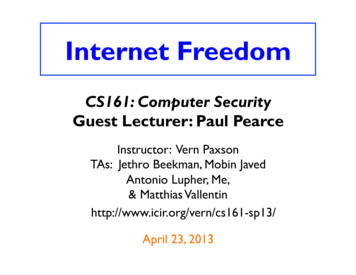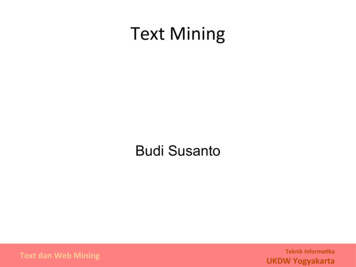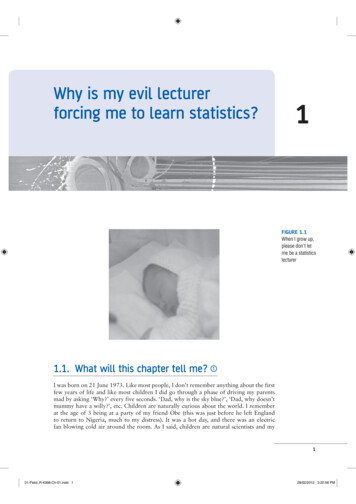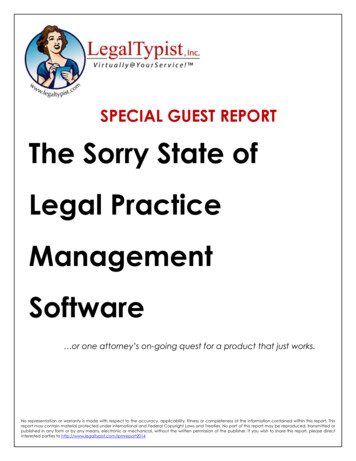
Transcription
Internet FreedomCS161: Computer SecurityGuest Lecturer: Paul PearceInstructor: Vern PaxsonTAs: Jethro Beekman, Mobin JavedAntonio Lupher, Me,& Matthias Vallentinhttp://www.icir.org/vern/cs161-sp13/April 23, 2013
Today’s Lecture What is “Internet Freedom?”– Buzzword encompassing: Anonymity Internet Censorship Network Neutrality
Anonymity Anonymity: Concealing your identity In the context of the Internet, we may wantanonymous communications– Communications where the identity of thesource and/or destination are concealed– Concealed from whom? Typically, the other party we are communicating with What about the network itself? Not to be confused with confidentiality– Confidentiality is about contents, anonymity is aboutidentities
Anonymity Internet anonymity is hard*– Difficult if not impossible to achieve on your own– Right there in every packet is the source anddestination IP address– * But it’s easy for bad guys. Why? You generally need help State of the art technique: Ask someoneelse to send it for you– (Ok, it’s a bit more sophisticated than that )
Proxies Proxy: Intermediary that relays our traffic Trusted 3rd party, e.g.
Proxies Proxy: Intermediary that relays our traffic Trusted 3rd party, e.g. hidemyass.com– You set up an encrypted VPN to their site– All of your traffic goes through them– Why easy for bad guys? Compromised machinesas proxies.
Alice wants to send a message M to Bob but ensuring that Eve can’t determine that she’sindeed communicating with Bob.
Alice wants to send a message M to Bob but ensuring that Eve can’t determine that she’sindeed communicating with Bob.Alice{M,Bob}KHMAHMAMBob
Alice wants to send a message M to Bob but ensuring that Eve can’t determine that she’sindeed communicating with Bob.Alice{M,Bob}KHMAHMAMBobHMA accepts messages encrypted for it.Extracts destination and forwards.
Proxies Proxy: Intermediary that relays our traffic Trusted 3rd party, e.g. hidemyass.com– You set up an encrypted VPN to their site– All of your traffic goes through them– Why easy for bad guys? Compromised machines asproxies. Issues?– Performance– 80- 200/year– “Trusted 3rd Party”– rubber hose cryptanalysis Government comes a “calling” (Or worse) HMA knows Alice and Bob are communicating Can we do better?
Onion Routing This approach generalizes to an arbitrary number of intermediaries (“mixes”) As long as any of the mixes is honest, no one can link Alice with BobAliceHMA{{M, Bob}KDan,Dan}KCharlie{{{M, Bob}KDan,Dan}KCharlie,Charlie}KHMANote: this is what theindustrial-strength Toranonymity service uses.(It also provides bidirectionalCharlie{M, Bob}KDanBobMDancommunication)Key concept: No one relay knows both you and thedestination!
Onion Routing Issues/Attacks? Performance: message bounces around a lot Key management: the usual headaches Attack: rubber-hose cryptanalysis of mix operators– Defense: use mix servers in different countries Though this makes performance worse :-( Attack: adversary operates all of the mixes– Defense: have lots of mix servers (Tor today: 2,000) Attack: adversary observes when Alice sends and whenBob receives, links the two together– A “confirmation” attack– Defenses: pad messages, introduce significant delays Tor does the former, but notes that itʼs not enough for defense
Onion Routing Attacks, con’t Issue: traffic leakage Suppose all of your HTTP/HTTPS traffic goes throughTor, but the rest of your traffic doesn’t– Because you don’t want it to suffer performance hit How might the operator of !"#! % &"'()*deanonymize your web session to their server? Answer: they inspect the logs of their DNS server tosee who looked up !"#! % &"'()* just before yourconnection to their web server arrived Hard, general problem: anonymity often at risk whenadversary can correlate separate sources of information
Onion Routing Attacks, con’t Issue: application leakage Suppose you want to send all your BitTorrent trafficover Tor to hide your IP – (Public service announcement: Please don’t do this) Problem:– BitTorrent includes your computer’s actual IP addressin the application protocol messages What about tracking cookies in your webbrowser? Javascript?
Onion Routing Attacks, con’t Issue: performing deanonymizing actions Suppose you want to anonymously search Google– Great. Right after I check my email,paul pearce berkeley cs161 ta@gmail.com If you perform some action that intrinsicallyidentifies you, all the technology in the worldcan’t help.
Internet Censorship The suppression of Internet communicationthat may be considered “objectionable,” by agovernment or network entity This is frequently (but not exclusively) relatedto authoritarian regimes We’re going to skip the politics (sorry), and goto the technical meat
Take these labels with a grain of salt. Read the report for yourselfSource: TN%202012%20summary%20of%20findings.pdf
HOWTO: Censorship Requirements:– Operate in real time inside of your network– Examine large amounts of network traffic– Be able to block traffic based on black lists,signatures, or behaviors Sounds a lot like a NIDS – Spoiler alert: These systems are basically NIDS
HOWTO: Censorship Approach #1: Blacklist IP addresses– Block all communication to a given set of IP addresses– Pros: Easy to do, low overhead– Cons: Brittle (must maintain black list), easy to evade(switch IPs), potential collateral damage Approach #2: DNS blacklisting and tampering– Ask for a banned domain via DNS? Send back badresponse– Similar pros and cons as #1, better if you want toblock domains instead of IPs How do we implement?– In-Path censor
ClientServer
ClientIn-Path CensorServer
IP BlockingDNS TamperingHTTP ProxiesClientIn-Path CensorServer
HOWTO: Censorship What if we know what (keywords) we want to censor,but not who? Approach #3: Look for censored keywords inside ofpackets– Pro: Far more flexible than IP/domain blacklists– Cons: Packet fragmentation can evade, slow Approach #4: Deep packet inspect– Reassemble TCP streams, understand application protocols– Pro: Harder to evade– Cons: Evasion still possible, Even slower How slow are these approaches? We need a newcensorship architecture– On-path censor
ClientServer
On-Path CensorClientServer
On-Path CensorClientServer
On-Path Censors On-Path device gets a copy of every packet– Packets are forwarded on before the on-path devicecan act (Wait, what?) Device can inject packets into the network This solves our speed problem– Why? We have a whole Round Trip Time (RTT) to make adecision (order milliseconds) In-path must make a decision in order microseconds! But what can we do if we’ve already forwardedthe packet?
On-Path CensorClientServer
On-Path CensorClientServer
On-Path CensorClientServer
On-Path CensorClientServer
On-Path CensorClientServer
On-Path CensorClientServer
On-Path CensorRSTClientRSTServer
On-Path CensorRSTClientRSTServer
On-Path CensorRSTClientRSTServer
On-Path CensorRSTRSTServerClientThis is how the elements of theGreat Firewall of Chinaoperate
Evasion Evading keyword filters– NIDS evasion techniques: TTLs, overlappingpackets, etc (see lecture 4/11)– Is there something simpler? Encryption! So that’s it right? We’ll just encrypt everything,they can’t stop that ri
Evasion Evading keyword filters– NIDS evasion techniques: TTLs, overlappingpackets, etc (see lecture 4/11)– Is there something simpler? Encryption! So that’s it right? We’ll just encrypt everything,they can’t stop that right wrong This is called an arms race
Evasion Evading both keyword and IP/Domainblacklists– Simple approach: Use a VPN If encryption is not banned this is a great solution Con: Easy to ban the VPN IP, especially if it’s public– More robust approach Use an onion router like Tor– Despite being built for anonymity, it has good censorshipresistance properties– Tor is the defacto standard for censorship resistance
Evasion Evading both keyword and IP/Domain blacklists– Simple approach: Use a VPN If encryption is not banned this is a great solution Con: Easy to ban the VPN IP, especially if it’s public– More robust approach Use an onion router like Tor– Despite being built for anonymity, it has good censorshipresistance properties– Tor is the defacto standard for censorship resistance Constant arms race between Tor and censoringgovernments,– Great talk: https://www.youtube.com/watch?v GwMr8Xl7JMQ
Related Activity:Intelligence Gathering Using sameinfrastructure,redirect users tomalicious sites,collect information
Net Neutrality Net Neutrality: The principle that networkproviders should treat all traffic equally– The corporate cousin of the censorship debate But why wouldn’t an ISP want to treat alltraffic equally?
Why?
Why?
Net Neutrality Core idea: Is an ISP selling you a pipe, or do they get asay in what goes over it?– Network Commoditization Pro:– Stifles innovation and competition– Preserves existing freedoms– End to end principle Con:– Prevents optimizing network performance– Commoditization ! worse performance What do you think?
Reminder:I have OH right after this, 751Soda
Proxy: Intermediary that relays our traffic rdTrusted 3 party, e.g. hidemyass.com – You set up an encrypted VPN to their site – All of your traffic goes through them – Why easy for bad guys? Compromised machines as proxies. Issues? – Performance – 80- 200/year – rd“Trusted 3 Party”











